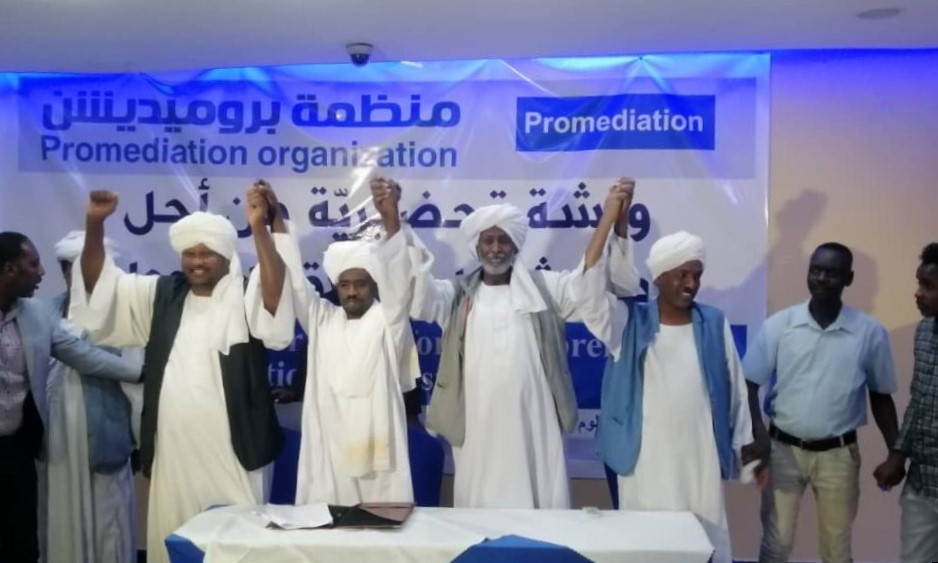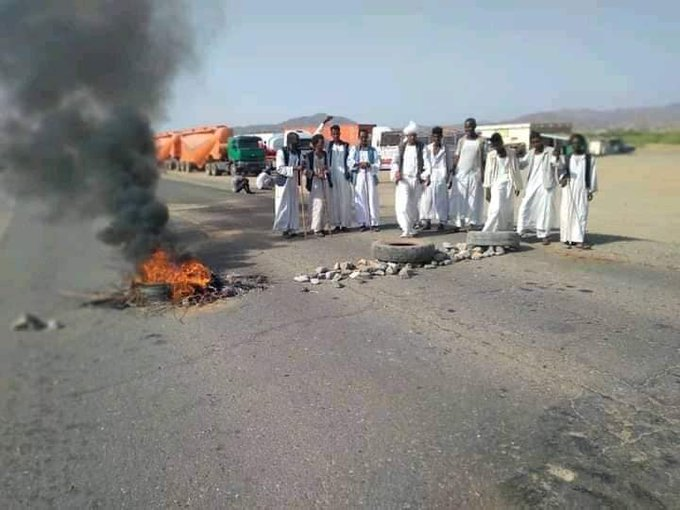Eastern Sudanese groups sign Declaration of Principles

Participants of the independent workshop on the future rule in eastern Sudan after signing the Declaration of Principles, Khartoum, March 4 (Social media)
KHARTOUM –
The two-day Preparatory Workshop on a Comprehensive Solution for Eastern Sudan in Khartoum concluded on Friday with the signing of a Declaration of Principles, in which the participants repeated the need for a broad negotiating platform about the future of the region under international auspices and guarantees.
Jaafar El Hasan, Political Secretary of the United Popular Front for Liberation and Justice chaired by El Amin Daoud, told Radio Dabanga that the workshop, facilitated by the French Promediation Organisation, adopted parts of the Juba Peace Agreement, the Eastern Sudan Peace Agreement (ESPA), the Sinkat and Shamboub Declarations, the El Gedaref People’s Initiative, and other accords and declarations.
The Declaration of Principles stipulates the formation of a reconciliation committee between disputing native administration* leaders, initiated by Sayed Tirik, head of the High Council of Beja Nazirs and Independent Chieftains, and the formation of a permanent reconciliation committee at the district level to guide the reconciliation processes and prevent future disputes. The participants of the workshop also agreed that the practice of political appointments of native administration leaders should be stopped.
“The workshop led to an important shift in the political and social relations in eastern Sudan,” El Hasan said. “It broke the stalemate between the Beja Nazirs Council and the United Popular Front, and the participants all agreed that the declaration is open to all eastern Sudanese parties.
He further noted that the main political groups of Red Sea state, Kassala, and El Gedaref do not recognise the outcomes of the conference on eastern Sudan organised by the AU-IGAD-UNITAMS Trilateral Mechanism in February.
Apart from the Beja Nazirs Council and the United Popular Front, the declaration was signed the Eastern Sudan Coordination, the Free Butana Platform, the El Gedaref People’s Gathering, the Civil Society Organisations and Youth Groups Alliance, the Unity and National Construction Movement, the Beja Conference Parties Coalition, the Beja Women Association, the Eastern Sudan Civil Association, and a number of eastern Sudanese resistance committees.

Signatories to the December 5 Framework Agreement did not attend the workshop, as well as the Beja Conference Forces Alliance and the High Beja Council wing under the leadership of Ibrahim Adarob.
Taha Badawi, Vice President of the Beja Conference Forces Alliance, told Radio Dabanga that they are not concerned with the results of the preparatory workshop for eastern Sudan.
He expressed his optimism about “the upcoming meeting of the people of eastern Sudan”, agreed upon by the participants of the Eastern Sudan conference, held under auspices of the Trilateral Mechanism in February.
The Beja Council-Adarob wing said it rejects “the rapprochement between Nazir Sayed Tirik and El Amin Daoud”, who said that it seeks to pass the path of the East through workshops and meetings, against the background of the Eastern Sudan workshop, which concluded its work on Friday.
In a press statement on Saturday, the Adarob wing announced it would mobilise the masses in the region to launch large protest actions against the Juba Peace Agreement and the recent conferences and workshops.
The Beja Nazirs Council under the leadership of Sayed Tirik has opposed the Eastern Sudan Track protocol since it was first agreed upon by the Sudanese government and the Sudan Revolutionary Front rebel alliance in the South Sudan capital of Juba in February 2020 as part of the Juba Peace Agreement.
The track was negotiated by the Beja Congress in Opposition and the United Popular Front for Liberation and Justice headed by Khaled Shaweesh. The then not yet divided High Council of Beja Nazirs and Independent Chieftains was not involved in the Juba peace negotiations and repeatedly opposed the contents of the protocol with large protest actions such as blocking the Khartoum-Port Sudan highway and the Southern Port in Port Sudan.
* The Native Administration was instituted by British colonial authorities seeking a pragmatic system of governance that allowed for effective control with limited investment and oversight by the state. According to the Darfur Bar Association (DBA), the Native Administration during the 30-year rule of dictator Omar Al Bashir did not represent the real local leaders and accused them of corruption.











 and then
and then